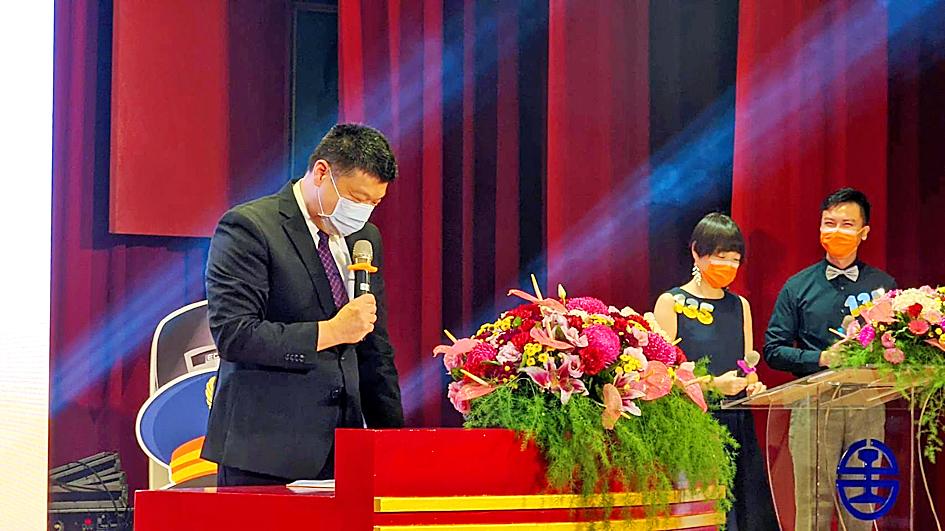Taiwan Railways Administration Director-General Du Wei (杜微) yesterday pledged to increase the punctuality of train services to 95 percent or higher this year.
Du made the remarks in a speech at a ceremony celebrating the 135th founding anniversary of the agency.
On Wednesday, Minister of Transportation and Communications Wang Kwo-tsai (王國材) said in an online talk show that the agency would not be allowed to raise ticket prices, which have not been adjusted for 26 years, until after it shows significant improvement in safety and punctuality.

Photo: Cheng Wei-chi, Taipei Times
The agency’s average punctuality rate between 2012 and last year was 93.4 percent, Du said, adding that it briefly fell to 92 percent after a Puyuma Express derailment in Yilan County in 2018 that killed 18 people and injured 215.
Train punctuality has risen to an average of 94.8 percent from January to May this year, he said.
“Our goal this year is to elevate the punctuality rate to 95 percent or higher,” Du said, adding that he hopes to set a punctuality record.
The agency’s punctuality rate exceeded 95 percent once, when it in 2009 reached 95.31 percent.
The agency has since June last year been conducting safety reforms, which has helped reduce the occurrence of incidents, he said.
The number of major incidents has fallen from seven last year to one this year, while the number of general incidents has dropped from 51 to 40, he said.
“We understand that we still have a lot of room for improvement, but we are speeding up the safety reforms by introducing a safety management system, and having train services validated and verified by a third party,” he said.
Trains that have been in operation for 40 years or more would by June 29 be replaced by new EMU900 commuter trains and EMU3000 intercity trains, he said.
The agency would also continue expanding its railway tourism business, he said.
More than 200,000 people used the agency’s tourism train services last year, generating revenue of more than NT$200 million (US$6.77 million), Du said, forecasting that railway tourism would become a key revenue source for the agency.

Beijing could eventually see a full amphibious invasion of Taiwan as the only "prudent" way to bring about unification, the US Department of Defense said in a newly released annual report to Congress. The Pentagon's "Annual Report to Congress: Military and Security Developments Involving the People's Republic of China 2025," was in many ways similar to last year’s report but reorganized the analysis of the options China has to take over Taiwan. Generally, according to the report, Chinese leaders view the People's Liberation Army's (PLA) capabilities for a Taiwan campaign as improving, but they remain uncertain about its readiness to successfully seize

Taiwan is getting a day off on Christmas for the first time in 25 years. The change comes after opposition parties passed a law earlier this year to add or restore five public holidays, including Constitution Day, which falls on today, Dec. 25. The day marks the 1947 adoption of the constitution of the Republic of China, as the government in Taipei is formally known. Back then the Chinese Nationalist Party (KMT) governed China from Nanjing. When the KMT, now an opposition party in Taiwan, passed the legislation on holidays, it said that they would help “commemorate the history of national development.” That

Taiwan has overtaken South Korea this year in per capita income for the first time in 23 years, IMF data showed. Per capita income is a nation’s GDP divided by the total population, used to compare average wealth levels across countries. Taiwan also beat Japan this year on per capita income, after surpassing it for the first time last year, US magazine Newsweek reported yesterday. Across Asia, Taiwan ranked fourth for per capita income at US$37,827 this year due to sustained economic growth, the report said. In the top three spots were Singapore, Macau and Hong Kong, it said. South

Snow fell on Yushan (Jade Mountain, 玉山) yesterday morning as a continental cold air mass sent temperatures below freezing on Taiwan’s tallest peak, the Central Weather Administration (CWA) said. Snowflakes were seen on Yushan’s north peak from 6:28am to 6:38am, but they did not fully cover the ground and no accumulation was recorded, the CWA said. As of 7:42am, the lowest temperature recorded across Taiwan was minus-5.5°C at Yushan’s Fengkou observatory and minus-4.7°C at the Yushan observatory, CWA data showed. On Hehuanshan (合歡山) in Nantou County, a low of 1.3°C was recorded at 6:39pm, when ice pellets fell at Songsyue Lodge (松雪樓), a